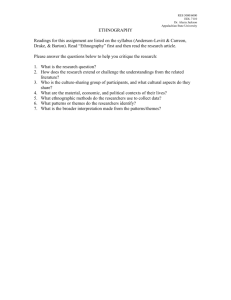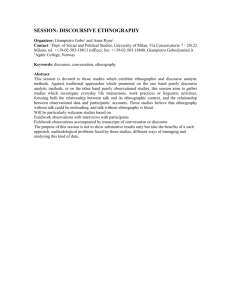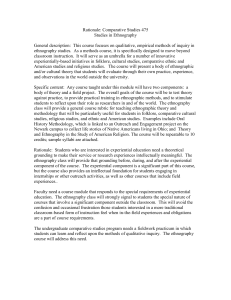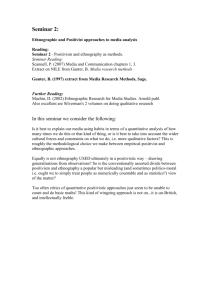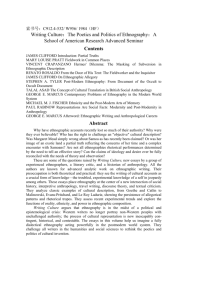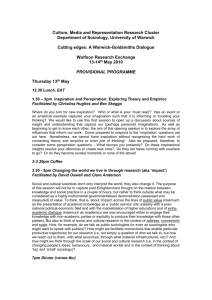what is ethnography in sociology?
advertisement
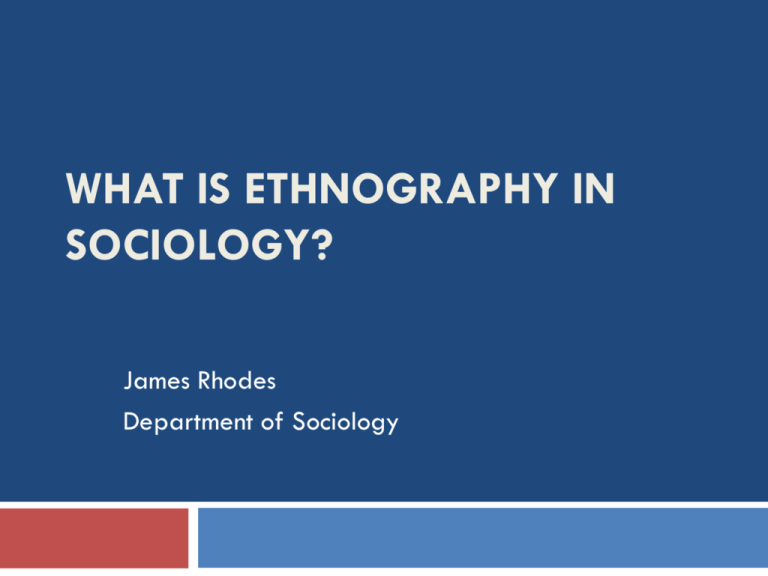
WHAT IS ETHNOGRAPHY IN SOCIOLOGY? James Rhodes Department of Sociology What is ethnography? ‘In its most characteristic form...[ethnography] involves the ethnographer participating, overtly or covertly, in people’s daily lives for an extended period of time, watching what happens, listening to what is said, asking questions- in fact, collecting whatever data are available to throw light on the issues that are the focus of the research’ (Hammersley and Atkinson, 1995:1). Minimal definition of ethnography Iterative-inductive research (that evolves in design through the study), drawing on A family of methods (multiple methods) Involving direct and sustained contact with human agents Within the context of their daily lives (cultures); Watching what happens, listening to what is said, asking questions, and Producing a richly written account That respects the irreducibility of human experience, That acknowledges the role of theory As well as the researcher’s own role And that views humans as part object/part subject (O’Reilly, 2005:3). Historical origins/context Malinowski and tradition of social anthropology (1920s) Ethnography seen as a methodological approach: ‘to use concrete statistical documentation to record the organization of the tribe and the anatomy of its culture To use minute, detailed observations to log the actual details of daily life To collect ethnographic statements, narratives, utterances as documents of native mentality’ (O’Reilly, 2005: 15). Chicago School and Sociology (1917-1942) Saw field research and observational methods as key to understanding the ‘natural ecology’ of Chicago: ‘these ethnographies studied face-to-face everyday interactions in specific locations. The descriptive narratives portrayed “social worlds” experienced in every day life within a modern, often urban, context…The investigator “took the role of the other” in these empirical investigations. A dynamic process incorporating social change, especially disorganizing and rapid changes in values and attitudes was emphasized. An openness to people, data, places and theory was intrinsic to the ethnographic process’ (Deegan, 2001:11). Ethnography and sociology ‘You have been told to go grubbing in the library thereby accumulating a mass of notes and a liberal coating of grime. You have been told to choose problems wherever you can find musty stacks of routine records. This is called “getting your hands dirty in real research”. Those who counsel you thus are wise and honourable men. But one thing more is needful: first hand observation. Go sit in the lounges of the luxury hotels and on the doorsteps of the flop-houses; sit on the Gold Coast settees and in the slum shakedowns; sit in the orchestra hall and in the Star and Garter Burlesque. In short, gentleman, go get the seat of your pants dirty in real research’ (Robert Park talking to students at University of Chicago in the 1920s, cited in Brewer, 2000:13, emphasis added). How it works Research Design Research practice Analysis and collation Writing up Research Design Start with your research questions: What are you interested in What do you think you might find What methods will you use What you already ‘know’ on the subject and what the existing research tells us Relevance in wider context Find out about the context in which your research will be basedsettings, people, time, and contexts (Hammersley and Atkinson, 1995:45-53). Negotiate access Research tools within ethnography Theoretical roles for observation Source: Hammersley & Atkinson, 1995, Ethnography, p. 104. (Reproduced from Junker, 1960) Analysing ethnographic data Brewer (2000:109) identifies a number of key steps in analysing data: Managing data and organising it in a logical fashion Indexing and categorising data Content analysis Qualitative description (key events, protagonists, practices, ideas, etc) Looking for recurring themes and patterns Developing categories, theories, typologies to help explain/conceptualise observed phenomena Incorporating exceptions into the account Writing up Brewer (2000:134) argues that ethnographic accounts should be structured by the following: Describing the context Number of participants (esp. Key individuals) Activities Time and order of research Routines and variations (social rules and basic patterns of order) Significant events Members’ perspectives and meanings Variety of voices and perspectives in the field (complexity) Reflection on research design, method, data, and findings When to use ethnography? Ethnography is most appropriately used for inquiry that requires: in-depth understanding rich narratives (if using qualitative interviews), empathy and experience Social phenomena being studied over a period of time. An understanding of the social meanings constructed by individuals’ themselves and the significance and nature of the practices they engage in Topics not easily accessible through simple face-to-face interviews involve ambiguity or ambivalence on the part of the actor, ‘topics which involve examining processes of change, examining negotiated lived experiences, topics which see culture as constructed and reconstructed through actors’ participation’ are especially suited to participant observation and ethnography’ (O’Reilly, 2005: 29). What understandings does it give? Ethnographic findings are often marked by: Richness of the data and account (variety of data, and ‘thick description’, Geertz). Allows for complexity and ambiguity Engages social actors in their ‘natural settings’ –allows for an understanding of social relations as embedded in context Reflexive in relation to the practice of research and the role of the researcher in producing knowledge Development of new theoretical insights Challenges of ethnography • • • • • • Very time consuming Completely reliant on the individual researcher (or a small team) Difficult to gain full access Difficult to achieve objective distance and the danger of ‘going native’ Reporting findings and the role of interpretation Ethical dilemmas of participation Loic Wacquant (2004) Body and Soul, Oxford: Oxford University Press. Wacquant spent over 3 years training in a Chicago boxing gym during late-1980s/early-1990s, and fought in Golden Gloves tournament. Wacquant trained, observed, gathered field notes, boxing magazines, life-history stories and interviews with boxers and trainers. Led by his interest in the ‘black American ghetto’; ‘it seemed to me impossible, for reasons both ethical and epistemological, to write about the South Side of Chicago without getting at least a rough sociological grasp of it at ground level’ (2004:ix). ‘It is imperative that the sociologist submit himself to the fire of action in situ; that to the greatest extent possible he put his own organism, sensibility, and incarnate intelligence at the epicentre of the array of material and symbolic forces that he intends to dissect’ (2004:viii). Monica McDermott (2006) Working-Class White, Berkeley: University of California Press Study of interactions, actions, conversations amongst individuals in predominantly white, but racially-mixed, working-class neighbourhoods in Boston and Atlanta in the late-1990s. Worked for one-year as a convenience store cashier in both locations. Employed a covert/semi-covert approach. Aimed to observe ‘race relations’ in a natural setting; ‘I am intent on using the vantage point of the corner store to describe the ways in which race structures life in two white working-class areas’ (2006:xi). McDermott: ‘This method yields rich descriptions...of specific social processes of interest that can be observed only while one actively participates in a community’s daily life’ (2006:ix). Resources Academic journals: Ethnography Journal of Contemporary Ethnography Websites: National Centre for Research Methods, <http://www.ncrm.ac.uk/> Economic and Social Data Service (list of available datasets that employ ethnographic methods) <http://www.esds.ac.uk/search/allSearch.asp?ct=xmlAll&q1=ethno graphic&zoom_and=1&zoom_cat=-1> Center for Urban Ethnography at Berkeley < http://cue.berkeley.edu/> Key readings Atkinson, P., Coffey, A., Delamont, S., Lofland, J. and Lofland, L. (eds.) (2001) Handbook of Ethnography, London: Sage. Brewer, J.D. (2000) Ethnography, Maidenhead: Open University Press. Hammersley, M. and Atkinson, P. (2007) Ethnography: Principles in Practice (Third Edition), London and New York: Routledge. O’Reilly, K. (2005) Ethnographic Methods, London and New York: Routledge.
